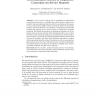Free Online Productivity Tools
i2Speak
i2Symbol
i2OCR
iTex2Img
iWeb2Print
iWeb2Shot
i2Type
iPdf2Split
iPdf2Merge
i2Bopomofo
i2Arabic
i2Style
i2Image
i2PDF
iLatex2Rtf
Sci2ools
CAISE
2006
Springer
2006
Springer
Resolving Underconstrained and Overconstrained Systems of Conjunctive Constraints for Service Requests
Given a service request such as scheduling an appointment or purchasing a product, it is possible that the invocation of the service results in too many solutions that all satisfy the constraints of the request or in no solution that satisfies all the constraints. When the invocation results in too many solutions or no solution, a resolution process becomes necessary for agreeing on one of the solutions or finding some agreeable resolution. We address this problem by imposing an ordering over all solutions and over all near solutions. This ordering provides a way to select the best-m with dominated solutions or dominated near solutions eliminated. Further, we provide an expectation-based resolution process that can take the initiative and either elicit additional constraints or suggest which constraints should be relaxed. Experiments with our prototype implementation show that this resolution process correlates substantially with human behavior and thus can be effective in helping user...
| Added | 13 Oct 2010 |
| Updated | 13 Oct 2010 |
| Type | Conference |
| Year | 2006 |
| Where | CAISE |
| Authors | Muhammed Al-Muhammed, David W. Embley |
Comments (0)

